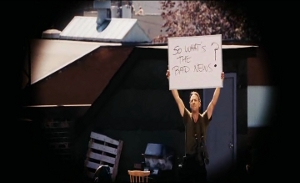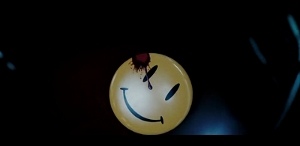Tag Archives: Zack Snyder
Man of Steel (2013)
Our review of the 2013 Superman film directed by Zack Snyder.
Man of Steel (2013)
Dawn of the Dead (2004)

The original Dawn of the Dead was twenty-six years old by the time this remake entered the pipeline. Its time had very much come and, in one sense, already gone. Tom Savini’s 1990 Night of the Living Dead remake celebrated its sweet sixteen by the time 28 Days Later broke out of its “low” budget genre ghetto, made it to Sundance, eventually broke out of that ghetto, too, and became a critical darling and smash hit…for whatever reason.
I try to ignore Spring horror films as much as I can because they tend to suck as a rule. (A popular example from the year in which I write – 2011 – would be the Scott Charles Stewart directed Paul Bettany vehicle, Priest.) January and February are studio dumping grounds for sub-standard, shitty movies they know no one will want to see. By March they’ve usually worked through the previous year’s back catalog and begun to ship out films designed specifically for home markets. Christ’s sake, no one really wants to watch big budget horror movies in March…but March is only seven months away from Halloween. Time enough for a film (like this one, which “only” cost $28 million) to earn its money back in theaters, allowing ancillary sales (like seasonally-appropriate DVDs and TV broadcast rights) to count as pure profit.
Predictably, this movie became the early breakout hit of 2004. Not that anyone at Universal actually predicted that. They were convinced the complete failure of 2003’s House of the Dead meant no one really wanted to see any more zombie movies. (And as long as by “no one” they meant “me” that statement held true.) Anyone with a functional brain could’ve told them House of the Dead failed because of two key words: “Uwe” and “Boll.” Never the less, Universal cut every corner they could, going so far as to turn the cameras over to some jumped up car commercial director named Zack Snyder. Continue reading Dawn of the Dead (2004)
300 (2006)

In spite of all the horrible things I’ve said about him over the years, I can’t really find it in myself to hate Zack Snyder. He is, in many ways, what we’ve always hoped for: a director who stood by his promise to faithful translate one of his favorite comic books to the screen…and succeeded. Unfortunately, he chose to translate this one, and I’ve got more than enough hate in me to spare some for Frank Miller. Despite everything he’s done to change the face of modern comic books, the man’s creative juices just don’t flow the way they used to, and there’s no better picture of the arid waste that lives in Miller’s head than this: his fantastical re-imagining of the battle of Thermopylae.
300 begins with an extended bit of ancient Spartan propaganda, following the long journey of King Leonidas (Gerard Butler) from birth to adulthood, narrated (like the rest of the film) by Leonidas’ friend and comrade-in-arms, Delios (David Wenham). Delios’ narrative selectively edits any embarrassingly-accurate pederasty or slave-killing out of the Spartan agoge in favor of gratuitous slow-motion wolf-killing. Because that’s really so much better. More dramatic than slave-killing, really…especially when the wolf is safely CGI. Continue reading 300 (2006)
Watchmen (2009)
 As if anyone doesn’t already know, Watchmen is an award-winning, twelve-issue comic book created by the writer/magician Alan Moore and the artist Dave Gibbons, originally published by DC Comics in that dark and distant year of your lord, 1986. Steeped in Reagan-era pessimism and dreams of nuclear holocaust, the book did more for superhero storytelling than all Frank Miller’s work combined. It dragged the genre, kicking and screaming, into the late twentieth century, disguising its social relevance with a baroque self-reflexiveness now recognized as the hallmark of comic’s Iron Age.
As if anyone doesn’t already know, Watchmen is an award-winning, twelve-issue comic book created by the writer/magician Alan Moore and the artist Dave Gibbons, originally published by DC Comics in that dark and distant year of your lord, 1986. Steeped in Reagan-era pessimism and dreams of nuclear holocaust, the book did more for superhero storytelling than all Frank Miller’s work combined. It dragged the genre, kicking and screaming, into the late twentieth century, disguising its social relevance with a baroque self-reflexiveness now recognized as the hallmark of comic’s Iron Age.
It is also, now, with the release of the extra-super-duper-special Ultimate Edition, a three and a half hour, suburban sprawl of a film, directed by MTV alum Zack Snyder. Reviewers love to crow about Watchmen‘s pivotal nature, seeing its reconstruction into a can’t-help-but-call-it-“epic” film as a watershed moment for superherodom. These contentions are as accurate as they are illiterate, removing the story from its proper place and time. An intelligent critique of this film has not and (I’ll obviously argue) cannot be written without a true understanding of the context that birthed Watchmen in the first place. {More}
